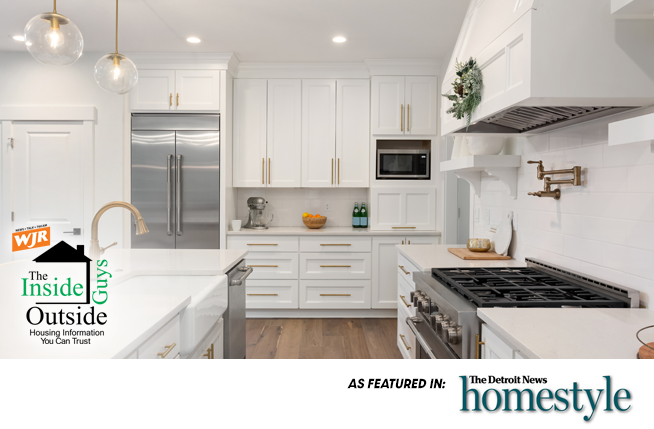
By Ken Calverley and Chuck Breidenstein
DETROIT, March 24, 2022 ~ Everyone in America uses them every day without thought. Kitchen cabinets are the midnight sentinel no one thinks about. They do their job without notice and are rarely acknowledged until they fail and need to be repaired or replaced.
Then it gets tricky.
In years gone by, when building for an owner, the contractor would assign a dollar amount, called an allowance, in the contract for kitchen cabinets then send the client off shopping to fulfill the specification within the budget assigned.
This often led to miscommunications and disagreements because there are so many considerations to accommodate. Semi-custom or stock? Real wood or manufactured product? Butt joints, dados, or dove-tailed joints? And what about the drawer glides, hinges and pulls?
The wide range of choices included pricing and performance differences such that the experience often led to budget over-runs and disappointment.
Cabinets are typically a high margin item with a broad range of pricing. Additionally, they include a wide range of specifications that can confuse and disorient a buyer that has never before purchased them.
A few of the basics include an understanding of a true custom cabinet versus a stock unit. True custom is one-of-a-kind whether you are talking size, style, features or materials. It is built uniquely for the single application of your home and no other.
The industry used to custom build all cabinetry in place for its specific use. Hardwoods including oak, birch, maple, mahogany, and others were used for frames, shelves, facing, doors, and drawers.
Then we developed a modular system of stock cabinets that could be mass-produced and used lower priced, synthetic wood product to construct the frames or “boxes” of the cabinets.
The visible portion, or “face,” of the cabinet still utilized stained hardwoods but over time even the face material evolved to painted, synthetic wood product. Knock-down units utilizing uniquely designed ball-and-cam hardware that are owner assembled, is now available in big-box stores and is almost exclusively synthetic wood product.
Semi-custom cabinets were developed to fill in the gap. These are still mass produced according to modular standards, but they offer more flexibility in terms of materials, features and layout. Thanks to the demands of Universal Design, you can also alter depths and heights of semi-custom units.
Something to keep in mind as the discussion continues is the term “man-made materials.” In the past, there was some negative connotation to using such products in a lot of applications, but new technologies have emerged to render that thinking largely obsolete. Manufactured product today can often eliminate the imperfections and high cost of natural wood and they tend to accept glues, mechanical fasteners and finishes extremely well.
The modular system we developed created stock units in incremental widths of 3 inches. So, you might look at a 9-inch-wide base cabinet for serving trays and a 15-inch-wide unit for drawers, called a drawer base. A minimum kitchen sink base is 36 inches wide but can be delivered as a 42- or 45 -inch unit to accommodate that three-bowl sink.
Where a typical base unit would have drawers at the top, a sink base cannot. But you can option hardware for the drawer faces that are bottom hinged and allow for storage of cleaning rags and sponges.
You can also option hardware that pulls down from wall-hung cabinets with the use of either a metal wand or remote-controlled motors. These allow access to stored goods to those of diminutive stature or people using wheelchairs. The list of potential options goes on and on.
So, the trick today is to work with a professional kitchen design firm that listens to and understands your needs and your budget.
The Guys advocate for purchasing the design and cabinets only from the installing firm. Do not go buy a set of cabinets, then begin a search for an installer. You will not be happy.
One such firm we trust is Kopke Remodeling & Design in Sterling Heights. They can take your dream folder and turn it into reality with professional craftsmanship and a written warranty to assure satisfaction.
For housing advice and more, listen to “The Inside Outside Guys” every Saturday and Sunday on 760 WJR, from 10 a.m. to noon or contact us at InsideOutsideGuys.com.
WJR TOP STORIES:
Thank you Detroit!
$2,064,269 raised during the SAY Detroit Radiothon … our biggest fundraising year EVER!
Thank you for helping to build better days in Detroit! See the official grand total announcement here!

